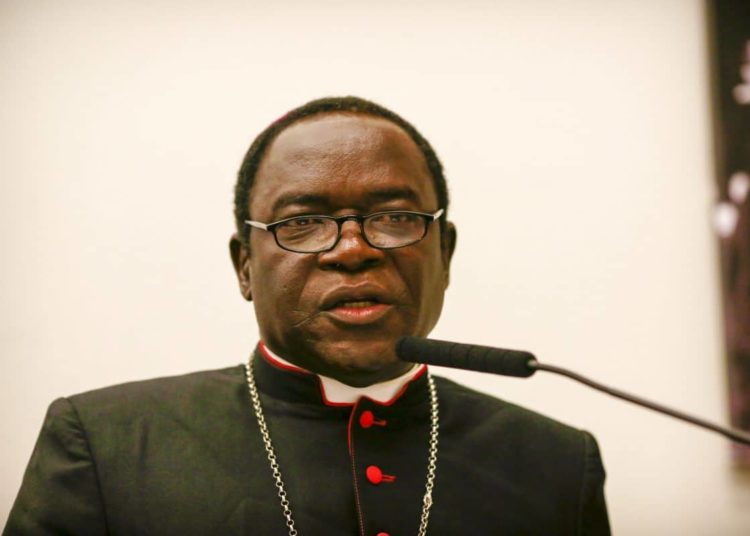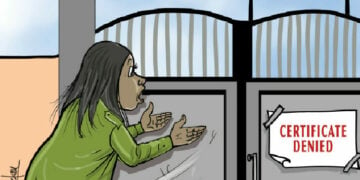For some of my professional colleagues who have had cause to advise me against writing further on Bishop Hassan Matthew Kukah because, according to them, I have written so much about him, I only wish they knew and understood why I write about this little Priest from Anchuna who is not tired of holding the mirror for our nation to appreciate its double-face posturing.
My relationship with the Bishop dates back to nearly four decades. Before meeting Fada, as he was popularly known and called, a relative of my mother had in 1978 persuaded her to withdraw me from the Army Children School, Sokoto, on account of my inability to speak English.
He recommended the mechanic workshop to my mother as the appropriate place for me to acquire the skills of fixing cars. After his meeting with my mother that lasted many minutes, perhaps an hour or so, he came to where I was seated with my other siblings. We all stood up in honour before groveling before him as he headed the direction of where he came from.
Moments later, my mother, who never attended any school, summoned me to her room. She looked worried. I became anxious of what she was taking her time to tell me.
Mum told me that her brother who had just left advised her to withdraw me from school on account of my inability to speak English.
Speaking in her Bajju language, she looked straight into my eyes and said: “I will not withdraw you from school. If I never went to school, my first son must go to school. Go and speak the English they are speaking for me. If it entails you being a wizard to speak English, please, I permit you to be a wizard and speak the English I cannot speak.”
It was a tall order and I knew that as a mild stutterer; the road to fulfilling my mummy’s wish was no doubt an uphill task.
The first day I read ‘The Mustard Seed’ column, I thought to myself, if I couldn’t speak the English that attracted the ire of my mum’s relation to plot my withdrawal from school, at least I could strive to become a good writer like Fada. That was the turning point for me. Then I commenced my journey to write like Fada.
I first sighted Fada at the Shehu Kangiwa Square sometime in 1983 during the Episcopal inauguration of Bishop Michael James Dempsey’s successor, then Rev Fr. Kevin Joseph Aje. Fada would later succeed him in 2011.
On sighting him, I held my breath as I came face-to-face with the writer of ‘The Mustard Seed’ who then was my boyish dream. It was for him that I trekked over five kilometres every Sunday from the Giginya Army Barracks in Sokoto to purchase a copy of Sunday New Nigerian.
“So, this is the Fada that is behind ‘The Mustard Seed’ column?,” I asked myself in disbelief.
I walked up to him and, with fear and trepidation, told him I wanted to be like him in future.
‘In what ways do you want to be like me when you grow up,” asked Fada.
‘I want to be a writer like you’.
He shook my hands and wished me good luck. It is better to dream of building castles in the air than be occupied in a dreamless land. Fada first provided me with the templates of how to become a writer. I am today because of what he represents.
Through the decades, I have watched his awesome rise to prominence. It takes more than the man for one to remain humble even when you are in high demands like the Catholic Bishop of Sokoto Diocese. He has not lost a debate in the many intellectuals sparring sessions he has been involved in. He is a comfortable with the wise and foolish just as he draws closer to himself both the old and the young. More than anything, he promotes debates and has the appropriate words to convince even the dumb with experiences garnered from deep research spanning several decades.
His 70th birthday celebration reveals his passion for the youth and future of Nigeria as his ever present contemplation. Coming from the backwaters of a tiny dot of a village called Anchuna, his prominence has brought recognition to not only his unknown village but his microscopic ethnic group in Zangon Kataf Local Government Area.
Those who see the Bishop in ethnic and religious uniforms always miss the essence of what he has come to represent. In line with his ecclesiastical calling, his focus is on the promotion of human brotherhood. In defending the cause of humanity, the scholarly cleric has come to realise that standing up for the overall interest of the whole gives freedom for the smaller units within a political entity.
Unlike most members of our nation’s intellectuals that are increasingly becoming weary of standing for the truth, having sold out their conscience to the devil for Jacob’s porridge, The Mustard Seed from Anchuna has refused to deviate from the ancient landmarks of truthfulness and unaffectedness in national discourse. To frame up the Bishop in divisive clothing and portray him as such is not only a grievous act of deceit but an attempt to sell falsehood for facts.
The Bishop comes from an area that has suffered injustices in various degrees. However, such has never turned him into an ethnic or religious bigot. He remains a voice for the oppressed as well as an advocate of good governance for the development of Nigeria.
Having watched him closely in the last two years or so, I have discovered that he seems to be in a hurry to leave behind legacies, especially among the youth. He dreams.of a time when the son of a nobody will become a somebody on account of their skills and not where they come from. Bishop Kukah looks forward to the future where Nigerians will walk through the doors of opportunity without being turned back on account of ethnicity and religious divides.
Apart from making The Kukah Centre a melting points for youths desiring to change Nigeria; the maiden edition of The Kukah Prize Award, instituted by Greysoft Technologies, led by its Chairman, Dr Manzo Daniel Maigari and its CEO, Mr. Raphael Isah, remains a beautiful dream that is capable of spurring our youths to embrace modern innovations in pulling the country out of the hole of underdevelopment.
Bishop Kukah is an imperishable brand in the endless commitment for the good of his countrymen and women. His penchant to always speak up when it matters the most sets him apart from others who are too careful not to ruffle feathers in critical times of indecision.
Even those in government know that the courageous Bishop is a true citizen who breathes and live the dream of a prosperous Nigeria. His unquenchable desire to see his country realise her manifest destiny in the comity of nations can’t just allow him sleep. Fada loves his priestly calling, but as someone who speaks about heaven; he refuses to remain silent against matters that affect citizens.
With the establishment of the The Kukah Centre, popularly known as TKC, the organisation is into partnership with various groups and development partners to grow the dream of the Bishop whose zeal in serving humanity is encapsulated in the words of a philosopher: “Those who think most of Heaven do most for the earth”.
At Kukah’s 70th birthday event that took place on Wednesday at the Sheraton Hotel and Towers, my daughter, Blamima, on seeing the distinguished personalities that graced the occasion, drew me closer and said: “Daddy, I think Bishop is more important than I was initially made to believe. To have attracted all these personalities indicates that he is loved by many”.
“We come from a tribe of humble and hard working people. We were taught by our parents to serve without demanding anything in return. Hard work, integrity and selflessness are our signatures. That is what Bishop Kukah stands for,” I whispered to her with small pride.
In Kukah, I told my daughter, we have offered to Nigeria a personality so endearing to humanity. Our ethnic group may not be known; we may continue to suffer all forms of deprivations, but we earnestly hold the promise of a new dawn that these injustices confining us into the dungeon of hopelessness shall sooner or later come to an end.
Bishop, I thank you for the inspiration you have been to me all these decades. I may not have any earthly possessions to show for these lessons; but I declare without any form of hesitation that your positive impacts on me and others will continue to linger endlessly.
With you, life starts at 70. May the Almighty God who has kept you from all harms continue to protect you in the decades to come. May your dream for our nation be realised in your life time!











